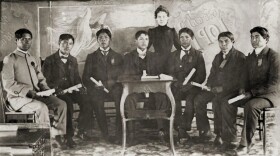-
A Southern Ute organization hosted a youth fashion event alongside an annual art market and juried show. Tribal youth and families showed off handmade and back-to-school outfits.
-
The Federal Communications Commission launched a new missing and endangered persons code for its nationwide Emergency Alert System. It will allow law enforcement to send out messages about missing adults to the public through phones, TV and the radio. The code is part of efforts to address the Missing and Murdered Indigenous Persons crisis throughout the country.
-
A new project asks travelers to donate to tribes whose homelands and sacred sites are occupied by parks and monuments. The goal is to compensate tribes connected to the land and to educate visitors.
-
A new federal investigation has found nearly 1,000 Native American children died while attending boarding schools created to strip them of their culture. The report, commissioned by Interior Secretary Deb Haaland, calls on the government to apologize.
-
Nationally, Native American people experience disproportionately high rates of recidivism. The Northern Arapaho reentry agency is intended to fight that trend on the Wind River Reservation.
-
Tribal communities across the country are being allocated $45 billion for “climate resiliency.” This includes big projects such as improving community electric grids and creating solar, wind and battery storage.
-
This year is the 100th anniversary of the Indian Citizenship Act, yet tribal leaders and advocates say too many Natives are still hesitant to vote.
-
The Gila River Indian Community near Phoenix has one of the largest shares of Colorado River water flowing through Arizona. Leading the tribe is Stephen Roe Lewis, a towering figure in the Southwest who has been pivotal in navigating a water crisis across the seven-state Colorado River basin. Lewis has leveraged the Gila River tribe's water abundance to help Arizona and others at a critical time, making his tribe a power player in the parched region.
-
A report published by a Native American-led nonprofit examines in detail the dispossession of Indigenous homelands in Colorado, quantifies the value of the land and resources taken and outlines the state education system's omission of that history in its curriculum.
-
A new collaboration between the Sand Creek Massacre Foundation and the Amache Alliance is educating young people about their history on Colorado's southeastern plains.

Play Live Radio
Next Up:
0:00
0:00
Available On Air Stations








